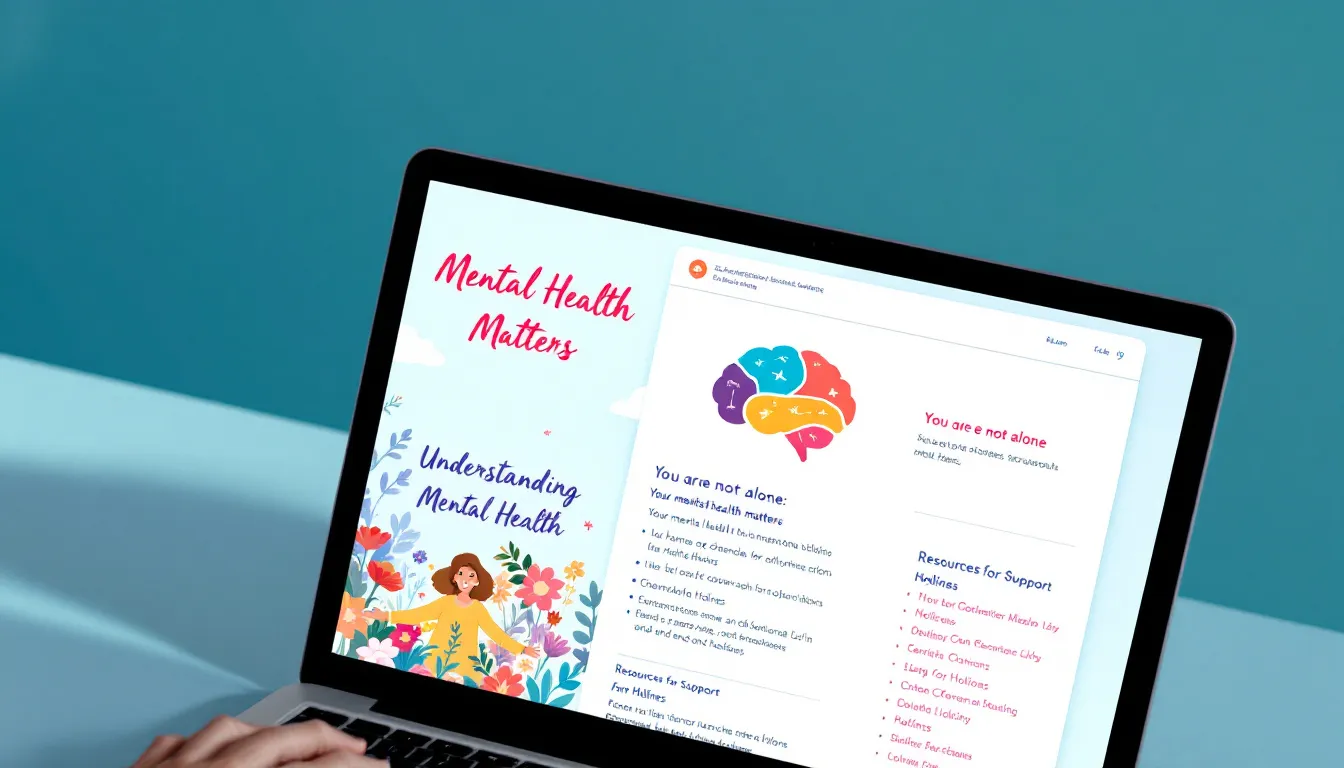Navigating the challenges of having a mentally ill family member is tough. This guide offers vital resources for family members of mentally ill individuals, from recognizing symptoms to finding professional help and support groups, tailored specifically for family members.
Key Takeaways
- Recognizing early signs of mental illness is crucial for timely intervention and appropriate support.
- Encouraging loved ones to seek professional help involves calm communication and understanding treatment options.
- Accessing mental health care may face numerous barriers, but awareness and resources like telehealth can aid in overcoming them.
Recognizing the Signs of Mental Illness

Identifying the signs of mental illness in a loved one is essential for offering the right support. Early indicators of mental health issues may include:
- Changes in sleep patterns, appetite, and energy levels
- Withdrawing from social interactions
- Neglecting personal hygiene
- Experiencing unexplained physical symptoms
- Increased substance use
Grasping these signs allows for timely intervention. Knowing the symptoms of mental illnesses like bipolar disorder or schizophrenia can help you identify when professional help is necessary for serious mental illness. Recognizing the signs and understanding their significance and urgency is vital.
Early recognition and intervention can greatly enhance outcomes for your loved one. Staying vigilant and informed helps ensure they recognize the necessary support promptly, potentially preventing the diagnosis from worsening.
Encouraging Professional Help
Start by talking about your concerns calmly and factually, as those who are concerned about mental health may find it daunting but crucial for encouraging your loved one to seek professional help. Begin by talking about your concerns calmly and factually, steering clear of alarmist language. Compare mental health struggles to general medical conditions like diabetes to help them understand the importance of seeking help.
If they are hesitant to see a mental health specialist, consider the following steps:
- Suggest visiting a general physician or doctor.
- Offer to accompany them to make the process less intimidating and provide a sense of security.
- If they refuse help and their safety is at risk, do not hesitate to alert their physician’s office.
- Call 911 if they are in immediate danger.
Learning about the illness is one of the best ways to support your family member. Knowing their condition allows you to provide informed support and effectively encourage them to seek professional help.
Understanding Treatment Options
Exploring treatment options for mental illness can be overwhelming. Treatments often involve a combination of medication, therapy, and support groups. Medications such as antipsychotics are commonly prescribed for serious mental illnesses, but they can come with side effects that may cause discomfort or lead individuals to stop taking them.
Knowing the range of treatment options and their potential side effects helps you support your loved one in making informed care decisions. Promoting open dialogue about their treatment can ease some of the discomfort they may feel discussing their medication as a patient.
Peer Support Groups

Peer support groups offer a vital platform for families of those with mental illness. They allow families to share experiences and offer mutual support, which can be incredibly comforting. Organizations like the National Alliance on Mental Illness (NAMI) and Mental Health America (MHA) offer various support groups tailored to specific needs.
Often focusing on specific themes like schizophrenia or borderline personality disorder, these groups enable families to:
- Connect with others facing similar challenges
- Express their feelings
- Learn coping strategies
- Gain practical insights from those who understand their struggles
The relief from connecting with others in similar situations is immense. Peer support groups help reduce feeling of isolation and provide a sense of community, understanding, and friend.
Educational Resources

Learning about mental illness is essential for offering effective support. Platforms like Coursera and Udemy offer courses on mental health awareness and caregiving techniques, which can be immensely helpful. Books by mental health professionals offer valuable insights and are readily available in libraries and bookstores.
The Substance Abuse and Mental Health Services Administration (SAMHSA) provides a wealth of resources and guides for families dealing with mental health issues. NAMI offers brochures and fact sheets covering various aspects of mental health, while the Mental Health America website provides tips and information on mental illness and family support.
Leveraging these resources helps you better understand your loved one’s condition and learn how to educate and support them effectively. Being well-informed empowers you to provide the best possible care.
Practical Support Strategies
Providing practical support is crucial in the recovery process for someone with a mental illness. Helping with daily tasks like grocery shopping or attending appointments can significantly ease their burden and provide emotional support. Establishing a structured routine provides a sense of stability and predictability, which is often comforting for those coping with mental illness.
Promoting participation in hobbies and activities can foster a sense of normalcy and enjoyment. Helping loved ones learn to use public transport and cook simple meals while preparing a child for independence can build confidence in many ways, contributing to their overall development through positive actions related to a job. Additionally, there are many free resources available to support these efforts.
A supportive family environment that promotes open communication and healthy habits is also crucial for recovery. Implementing these practical support strategies can make a meaningful difference in your loved one’s daily life and overall well-being.
Self-Care for Caregivers

The demands of caregiving can be emotionally and physically taxing, making self-care crucial for maintaining your well-being. Without proper self-care, caregivers risk burnout, which can negatively affect the quality of care they provide. Practices like mindfulness and meditation can help manage stress and enhance emotional resilience.
Recognizing that providing family support can lead to emotional strain and grief is important. Seeking support from peer groups or professional counseling can help caregivers protect navigate these challenges and find emotions balance.
Taking care of yourself benefits you and enables you to be a more effective person caregiver for your loved one.
Navigating Barriers to Care
Accessing mental health care often comes with barriers. The shortage of mental health professionals means many people struggle to find the help they need. Additionally, many psychiatrists do not accept insurance, further limiting access to services. Insurance policies often use restrictive practices that hinder access to care, such as denying claims based on inconsistent definitions of medical necessity.
Stigma and misconceptions about mental illness remain pervasive, creating additional difficult challenges and other problems. Anticipating potential answers and researching local resources can help navigate these barriers and alleviate fear, allowing individuals to better cope.
Telehealth, which saw increased usage during the COVID-19 pandemic, offers a viable alternative for accessing mental health services. Practical support such as transportation, financial assistance, and housing can also make a significant difference.
Address these barriers ensures individuals receive the mental health support they need and deserve.
Affordable Support Is Possible: Empower U Accepts Medicaid in New Jersey
At Empower U, we believe that mental health care should be accessible to everyone—regardless of income or insurance status. That’s why our team of licensed therapists proudly provides care to Medicaid mental health clients in New Jersey.
Whether you’re searching for a Medicaid therapist in NJ, looking for adult therapists that accept Medicaid, or need support for your teen, Empower U is here to help. We offer individual, family, couples, and group therapy both in-person and through secure virtual sessions. Our compassionate providers work with teenage clients, adults, and families across the state.
If you’re searching for a Medicaid therapist online or need help navigating your insurance benefits, we’re happy to guide you through the process so you can get the care you deserve without added stress.
To learn more or verify your coverage, contact us here or schedule a free consultation today.
Long-Term Support and Recovery

Recovery from a mental health challenge is a long and often non-linear journey, marked by progress and setbacks. Family members must be ready to provide support for the long haul, not just during crises. Recognizing and praising your loved one’s strengths and progress can be highly encouraging and motivating for them.
An important aspect of recovery involves managing one’s affairs and pursuing personal goals. Support from family, friends, and peers is essential for individuals facing serious mental illnesses. With your loved one’s permission, closely working with professionals on the care team and participating in treatment planning can be beneficial.
Even if it sometimes feels like your supporting support isn’t making a difference, it likely has a positive impact on your loved one.
Mental Health Resources for New Jersey Residents
If you or a loved one is navigating mental health challenges in New Jersey, you’re not alone—and support is available. Whether you’re in crisis or simply need someone to talk to, these local hotlines and services can provide immediate and ongoing help:
In an emergency, always dial 911.
24/7 Hotlines and Support Services:
- NJ Suicide Prevention Hopeline: 855-654-6735
- ReachNJ (Addiction Help Line): 844-732-2465
- IME Addictions Access Center: 844-276-2777
- NJ Connect for Recovery (Family Support for Addiction): 855-652-3737
- The Peer Recovery Warmline: 877-292-5588
- National Suicide Hotline: 800-273-8255
- NJ Mental Health Cares: 866-202-HELP (4357)
- TTY: 1-877-294-4356
- Email: [email protected]
- Council on Compulsive Gambling of NJ (800-GAMBLER): 800-426-2537
- Veterans Counseling Hotline: 866-VETS-NJ4 (838-7654)
- New Jersey Poison Control: 800-222-1222
These services are staffed by trained professionals and peer specialists who can offer emotional support, connect you with treatment resources, and help you or your loved one take the next step toward recovery.
No matter where you are in your journey, help is just a phone call away.
Supporting Your Loved One with Resources for Family Members of Mentally Ill
Supporting a loved one with mental illness is a journey filled with challenges and uncertainties. Recognizing the signs of mental illness, encouraging professional help, understanding treatment options, and utilizing resources like peer support groups and educational materials are all crucial steps in this process. Practical support and self-care for caregivers are equally important in ensuring a balanced approach to care.
Ultimately, your support can make a significant difference in your loved one’s recovery journey. By staying informed, compassionate, and resilient, you can help them navigate the complexities of mental health and work towards a brighter, healthier future together.
Frequently Asked Questions for Loved Ones Concerned About Serious Mental Illness
What are the common signs of serious mental illness to look out for?
Common signs of mental illness include changes in sleep, appetite, and mood, fluctuations in energy levels, increased substance use, neglect of personal hygiene, and unexplained physical symptoms. Recognizing these signs is crucial for timely intervention.
How can I encourage a loved one to seek professional help?
Encouraging a loved one to seek professional help can be effectively achieved by initiating a calm and factual conversation about your concerns, comparing mental health struggles to physical health issues. Additionally, offer to accompany them to a general physician to ease their hesitation towards consulting a specialist.
What are the treatment options for mental illness?
Treatment options for mental illness typically include medications such as antipsychotics, various forms of therapy, support groups, and occasionally herbal remedies. It is essential to consult a healthcare professional to discuss these options and their potential side effects.
What role do peer support groups play in supporting family members?
Peer support groups play a crucial role in supporting family members by offering a platform for shared experiences, emotional support, and practical advice tailored to their specific needs. This connection can significantly enhance their coping strategies and overall well-being.
How can caregivers practice self-care?
Caregivers can effectively practice self-care by incorporating mindfulness and meditation into their routines, seeking support from peer groups or professionals, and prioritizing their own well-being. This approach not only enhances their health but also improves their ability to care for others.
